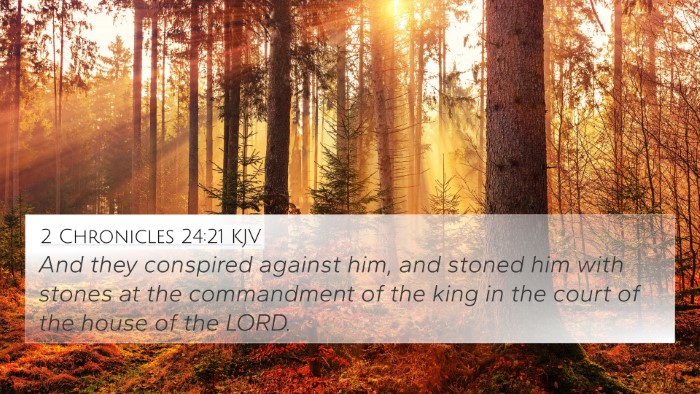Understanding 2 Chronicles 10:18
Bible Verse: 2 Chronicles 10:18
In this verse, the rebellious nature of the Israelites and the consequences of their decisions are highlighted through the actions of their newly appointed king, Rehoboam.
Summary of 2 Chronicles 10:18
Rehoboam, upon becoming king, is approached by the people of Israel seeking relief from the heavy burdens imposed by his father, Solomon. Instead of showing wisdom and compassion, Rehoboam chooses to follow the unwise advice of his peers rather than seek the counsel of the elders who served his father. This decision marks a pivotal moment in Israel’s history, leading to the division of the kingdom.
Commentary Insights
-
Matthew Henry: emphasizes that Rehoboam's rejection of wise counsel is a tragic mistake, showcasing the importance of seeking wisdom from experienced advisors instead of relying solely on youthful exuberance. This act illustrates that effective leadership requires humility and the willingness to listen to others.
-
Albert Barnes: points out the duality of Rehoboam's rule and the consequences of his actions. Instead of uniting the nation, his decisions resulted in division, setting a course that would lead to conflict and strife in Israel.
-
Adam Clarke: elaborates on the socio-economic context of the demands made by the people, indicating that they were not merely complaining but were legitimately seeking fair treatment. Clarke underscores that Rehoboam's failure to heed their plea reflected a disregard for the welfare of his subjects.
Key Themes and Reflections
The unfolding narrative in 2 Chronicles 10:18 underlines several vital themes relevant to leadership, wisdom, and the responsibility of kingship. Rehoboam’s actions reflect the critical nature of informed decision-making and understanding the voice of the people.
Bible Verse Cross-References
- 1 Kings 12:1-16 - The account of Rehoboam's interaction with the people and the subsequent division of the kingdom.
- Proverbs 11:14 - Acknowledge the importance of counsel in times of leadership decisions.
- Proverbs 15:22 - Highlights the value of seeking advice from a multitude of counselors.
- 2 Chronicles 12:1-2 - Illustrates the consequences of forsaking the Lord, leading to division.
- Micah 4:1-5 - The vision of the future when nations will come together in peace, contrasting with Rehoboam's divided kingdom.
- James 1:5 - The call to ask God for wisdom in decision-making.
- 1 Corinthians 1:10 - Encouragement for unity rather than division among believers.
Connections Between Bible Verses
This incident in 2 Chronicles serves as an example of the thematic connections between various scriptures regarding leadership and wisdom. The foolishness of ignoring wise counsel is a recurring motif in the Scriptures, with parallels found throughout the wisdom literature, especially in Proverbs.
Linking Bible Scriptures
The narrative invites exploration of passages that discuss the characteristics of effective leadership (e.g., Matthew 20:26-28) and the significance of humility (e.g., Philippians 2:3). By comparing these verses, one can discover deeper insights into how God values unity and wise governance.
Tools for Bible Cross-Referencing
Utilizing tools such as a Bible concordance or a Bible cross-reference guide can enhance one's study of these connections. They allow readers to effectively employ a Bible cross-reference system that organizes themes and ideas, facilitating a thorough comprehension of scripture.
Concluding Thoughts
The story in 2 Chronicles 10:18 resonates as a cautionary tale about the significance of wise counsel and attentive leadership. It reflects the broader biblical principles of humility, unity, and the profound impacts of leadership decisions on a community. In studying these connections or seeking Bible verses that relate to each other, one engages in a deeper understanding of the narrative of the Bible and the continuous messages throughout its pages.






